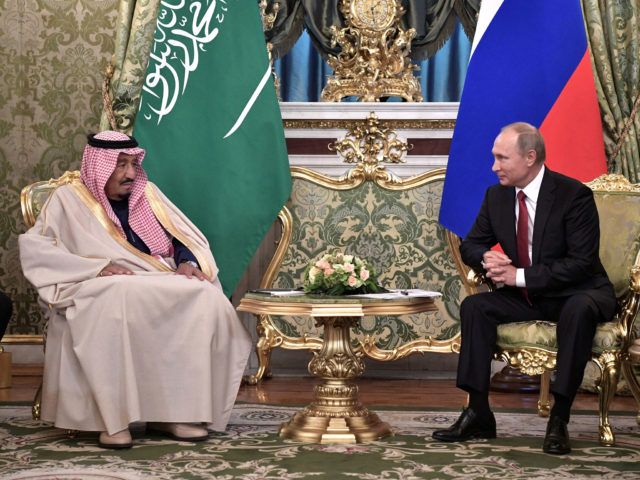
Arms and the King in Saudi-Russian Relations
Publication: Eurasia Daily Monitor Volume: 14 Issue: 127
By:

Vladimir Putin described Saudi King Salman bin Abdulaziz Al Saud’s visit to Moscow as “momentous” (see EDM, October 10; RIA Novosti, October 5); and it certainly was. In similar fashion, Foreign Minister Sergei Lavrov commented that the Saudi monarch’s visit constituted a “turning point in relations,” which takes the relationship to an entirely new level (Al-Sharq Al-Awsat, October 4). One area that truly represented a momentous turning point was arguably the agreement between the Russian and Saudi governments to sign a memorandum of understanding (MoU) stating Russia’s intention to sell Saudi Arabia the S-400 anti-air missile defense system as well as to open a Kalashnikov factory in the Gulf country. Putin, in fact, had hinted that a major deal was forthcoming in his earlier appearances (Kremlin.ru, October 4).
If the arms deal took observers and officials in the United States by surprise, it is nevertheless part of a larger geostrategic mosaic in which Riyadh, as Russian experts noted, had to acknowledge Moscow’s importance as an arbiter of multiple Middle Eastern issues (notably Syria) and depart from what they called the “dogma” of counting solely on Washington (Valdaiclub.com, October 7). The arms deals, though by no means the only consequential agreements reached in Moscow, are naturally of particular importance because they represent the first time Moscow has been able to make inroads into the Saudi market and gain access to that country’s Armed Forces. Of course, it may yet transpire that the S-400 will not actually be sold to Saudi Arabia, because the parties only signed an MoU, not a binding contract. Nevertheless, that deal and the building of a Kalashnikov plant do represent a serious intrusion by Moscow into what had been a Western and especially US preserve with regard to arms sales. In this respect, therefore, the S-400 deal, whatever its final outcome, is “momentous.”
The regional repercussions of these arms deals are also noteworthy. First, despite the fact that recent US legislation would mandate or at least justify sanctions on Riyadh for agreeing to buy weapons from Russia, the State Department nevertheless announced the approval of the sale of the THAAD (Terminal High Altitude Air Defense) missile system to Saudi Arabia on October 6, one day after the S-400 announcement in Moscow (Al-Monitor, October 9). This decision by Washington would appear to justify the suspicion that Riyadh used the Russians and the signed MoU as leverage over the US to end its procrastination over the THAAD sale to Saudi Arabia.
A second factor suggesting the S-400 sale will never actually materialize—or if it does, will not do Saudi Arabia much good—is the fact that Moscow recently announced that even though Turkey had contracted for and begun paying for Russian deliveries of the S-400, “We [Russia] will not give them any of the electronic codes or ‘internals.’ Under the agreement, technical servicing will only be done by Russia and they [the Turks] will not gain entry to the systems,” a Russian military source told Gazeta.ru. Moreover, Ankara will not even obtain those systems until Moscow finishes deploying them at home and selling them to China and India (Russiafeed.com, October 9). Consequently, Saudi Arabia should not expect to acquire this system before 2021 or 2022. Furthermore, the S-400’s quality relative to THAAD and whatever newer systems emerge by then might not be particularly commendable. Nor is it likely that Saudi-US ties will suffer greatly in the long term, even though the totality of the deals made in Moscow—and the arms sales, in particular—constitute a real slap in the face to Washington.
In evaluating the impact of these sales, it is clear that Saudi Arabia wants protection against Iran and its air force and perhaps potentially against Israel, too—although at present, that relationship is at its peak, albeit a tenuous one. Inasmuch as Saudi Arabia is fighting Russian- and Iranian-backed Houthi rebels in Yemen and is challenging Iran across the Gulf, prudence in the face of an Iranian threat is more than justified. Moreover, in a sense, the use of arms deals to bring Russia closer to Saudi Arabia or the lure of money to be made through such deals is merely an extension of traditional Saudi diplomacy. However, air defenses will not do much to curtail the threat of the Houthi rebels in Yemen or to prevent Iran from extending its sway in Syria. Indeed, Saudi Arabia essentially agreed Bashar al-Assad will remain in power once Syria is reconstituted within its full boundaries and with a functioning state. Notably, as the head of the Saudi Consultative Committee’s Foreign Affairs Council, Zahir al-Harithi, stated, Russia’s presence in the Middle East will contribute to the creation of a balance of power and resolve complex regional issues (Sputnik News, October 9). That is hardly something the US or its other Middle Eastern allies are likely to welcome as a factor for stability, especially since Moscow will not restrain Iran. Indeed, although the Russian government assured Israel it would seek to restrain Iran in Syria, no such promises came out of the talks with Saudi Arabia (Times of Israel, September 12). Thus, is that a situation with which anyone can or should feel comfortable?



